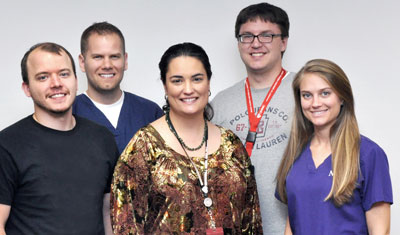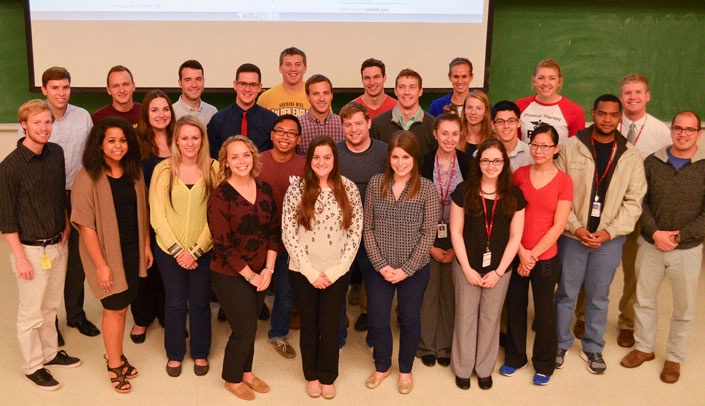Last week, the Office of the Vice Chancellor for Academic Affairs awarded 19 E-Learning Award grants of $1,000 to teams of UNMC students and faculty members who will be creating another generation of e-learning modules at UNMC.
Dele Davies, M.D., the vice chancellor for academic affairs, called the students “pioneers.” This set of grants is the second awarded to students to conceive and create e-learning modules, while there have been two cohorts of faculty developers since the program debuted in 2013.
 |
College of Dentistry awardees (from left) Roy Burkhalter, Grant Essink, advisor Jennifer Kallio, D.D.S., Levi Brinkerhoff and Halie Bricker. |
“Our students have really bought into the idea of interactive learning, and the idea of having short modules that they can actually use to gather most of the information they need,” said Dr. Davies, who attended the event.
“It’s really amazing to see the number of students who are here today and the interest across campus from different colleges. It’s very inspiring to know that our students are really beginning to be the ones helping to push the boundaries of this technology.”
For a complete list of awardees and approved module projects, click here.
The 19 projects nearly double the 11 that were approved in 2014, demonstrating an increased interest in e-learning, said Peggy Moore, an e-learning instructional designer.
“And about half of the awardees have faculty involved who have not previously worked on e-learning modules, so we’re seeing growing interest across campus,” she said.
Among what Dr. Davies called “an amazing diversity of innovative ideas” are modules on:
- Rapid on-site evaluation;
- Scrub technique and E.R. etiquette;
- Symptom and pain management in palliative care; and
- Mastering the brachial plexus, among others.
For more information about the projects, click here.
Faculty even may learn from the more tech-savvy students, Dr. Davies said, while helping the students make their modules academically relevant.
“The fact that we have this partnership between students and faculty make sure this will be an enduring legacy,” he said.
The next challenge, Moore said, would be building the modules, and instructional designers across all colleges will be pitching in to help.
“We know that it takes about 100 hours of development time for each 15-minute module,” she said. “So these students have committed a big portion of their time to developing e-learning. We are very appreciative of their efforts and excited to see the finished modules in April.”
